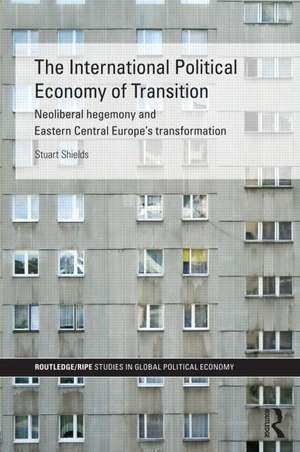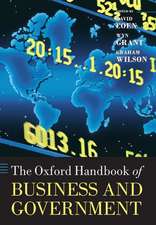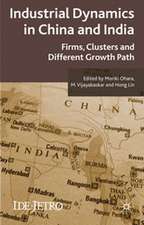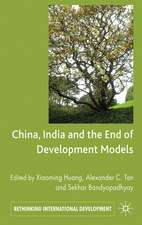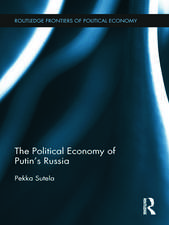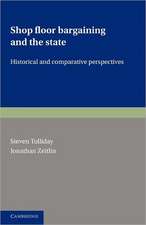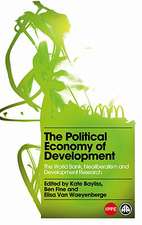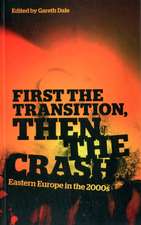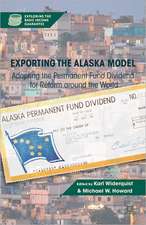The International Political Economy of Transition: RIPE Series in Global Political Economy
Autor Stuart Shieldsen Limba Engleză Hardback – 16 mai 2012
Adopting an innovative Gramscian approach to post-communist transition, this book charts the rise to hegemony of neoliberal social forces. Using transition in Poland as a starting point, the author traces how particular social forces most intimately associated with transnational capital successful in the struggle over competing reform strategies. Transition is broken down into three stages; the "first wave" illustrates how the rise of particular social forces shaped by global change gave rise to a neoliberal strategy of capitalism from the 1970s. It goes on to show how the political economy of Europeanization, associated with EU enlargement instilled a "second wave" of neoliberalisation. Finally, exploring recent populist and left wing alternatives in the context of the current financial crisis, the book outlines how counter-hegemonic struggle might oppose a "third wave" neoliberalisation.
The International Political Economy of Transition will be of interest to students and scholars of international political economy, post-communist studies and European politics
Din seria RIPE Series in Global Political Economy
-
 Preț: 310.75 lei
Preț: 310.75 lei -
 Preț: 280.02 lei
Preț: 280.02 lei -
 Preț: 281.27 lei
Preț: 281.27 lei -
 Preț: 310.01 lei
Preț: 310.01 lei -
 Preț: 390.13 lei
Preț: 390.13 lei -
 Preț: 288.81 lei
Preț: 288.81 lei - 28%
 Preț: 820.21 lei
Preț: 820.21 lei - 18%
 Preț: 700.75 lei
Preț: 700.75 lei -
 Preț: 386.55 lei
Preț: 386.55 lei -
 Preț: 470.90 lei
Preț: 470.90 lei - 18%
 Preț: 999.82 lei
Preț: 999.82 lei - 18%
 Preț: 1054.97 lei
Preț: 1054.97 lei - 18%
 Preț: 1057.40 lei
Preț: 1057.40 lei - 18%
 Preț: 1055.60 lei
Preț: 1055.60 lei - 18%
 Preț: 1053.16 lei
Preț: 1053.16 lei -
 Preț: 362.26 lei
Preț: 362.26 lei -
 Preț: 456.16 lei
Preț: 456.16 lei - 18%
 Preț: 1058.79 lei
Preț: 1058.79 lei - 18%
 Preț: 1057.89 lei
Preț: 1057.89 lei - 28%
 Preț: 822.54 lei
Preț: 822.54 lei -
 Preț: 278.75 lei
Preț: 278.75 lei - 18%
 Preț: 1056.47 lei
Preț: 1056.47 lei - 18%
 Preț: 1057.89 lei
Preț: 1057.89 lei - 18%
 Preț: 1054.89 lei
Preț: 1054.89 lei -
 Preț: 453.96 lei
Preț: 453.96 lei -
 Preț: 411.42 lei
Preț: 411.42 lei -
 Preț: 428.67 lei
Preț: 428.67 lei - 28%
 Preț: 821.53 lei
Preț: 821.53 lei -
 Preț: 487.86 lei
Preț: 487.86 lei -
 Preț: 353.94 lei
Preț: 353.94 lei - 31%
 Preț: 766.24 lei
Preț: 766.24 lei - 18%
 Preț: 1058.43 lei
Preț: 1058.43 lei - 15%
 Preț: 425.07 lei
Preț: 425.07 lei - 18%
 Preț: 696.82 lei
Preț: 696.82 lei -
 Preț: 395.16 lei
Preț: 395.16 lei - 18%
 Preț: 700.31 lei
Preț: 700.31 lei - 18%
 Preț: 1004.20 lei
Preț: 1004.20 lei -
 Preț: 465.69 lei
Preț: 465.69 lei - 15%
 Preț: 672.40 lei
Preț: 672.40 lei - 18%
 Preț: 1016.52 lei
Preț: 1016.52 lei - 18%
 Preț: 1115.21 lei
Preț: 1115.21 lei -
 Preț: 485.07 lei
Preț: 485.07 lei
Preț: 846.78 lei
Preț vechi: 1139.91 lei
-26% Nou
Puncte Express: 1270
Preț estimativ în valută:
162.08€ • 176.12$ • 136.24£
162.08€ • 176.12$ • 136.24£
Carte tipărită la comandă
Livrare economică 21 aprilie-05 mai
Preluare comenzi: 021 569.72.76
Specificații
ISBN-13: 9780415386692
ISBN-10: 0415386691
Pagini: 192
Dimensiuni: 156 x 234 x 15 mm
Greutate: 0.4 kg
Ediția:1
Editura: Taylor & Francis
Colecția Routledge
Seria RIPE Series in Global Political Economy
Locul publicării:Oxford, United Kingdom
ISBN-10: 0415386691
Pagini: 192
Dimensiuni: 156 x 234 x 15 mm
Greutate: 0.4 kg
Ediția:1
Editura: Taylor & Francis
Colecția Routledge
Seria RIPE Series in Global Political Economy
Locul publicării:Oxford, United Kingdom
Public țintă
Postgraduate and UndergraduateCuprins
1. Introduction: Contextualizing post-communist transition. 2. Theorizing the international political economy of post-communist transition. 3. Towards passive revolution: The making of modern Eastern Central Europe. 4. The emergence of neoliberal social forces in the struggle for hegemony. 5. From shock therapy to Europeanization: Neoliberalization through depoliticization 6. Counter hegemonic social forces in post communist transition 7. Conclusion: Beyond transition? Beyond the transnational?
Notă biografică
Stuart Shields teaches International Political Economy at the University of Manchester
Recenzii
This book is shortlisted for the 2013 BISA IPEG Book Prize
"This book is a must read for all those people interested to know why Poland is such a success story - a ‘rising star’ according to international financial media - in the current, crisis-ridden European Union. And why Poland, and other East Central European member states, may very well become next in line in the ongoing sovereign debt crisis." - Otto Holman, University of Amsterdam, The Netherlands.
"With his careful historical-structural research, Shields responds in the best of possible ways to stylized transitology and IPE canons. Changing the world may be hard, but neo-Gramscians can most certainly interpret it." - Magnus Ryner, King’s College London, UK.
"Stuart Shields' new book provides an exemplary model of how to formulate and use a critical IPE approach to understanding significant contemporary developments. Although the subject of his book is the political economy of post-communist transition in central and eastern Europe, the context is the deep-seated transformations currently underway in the global political economy. His book is empirically rich and theoretically insightful. It takes the debate over the future of neoliberal forms of capitalism to a new level, and will be mandatory reading for all scholars interested in advancing a critical understanding of IPE." - Randall Gemain, Carleton University, Canada.
"This book is a must read for all those people interested to know why Poland is such a success story - a ‘rising star’ according to international financial media - in the current, crisis-ridden European Union. And why Poland, and other East Central European member states, may very well become next in line in the ongoing sovereign debt crisis." - Otto Holman, University of Amsterdam, The Netherlands.
"With his careful historical-structural research, Shields responds in the best of possible ways to stylized transitology and IPE canons. Changing the world may be hard, but neo-Gramscians can most certainly interpret it." - Magnus Ryner, King’s College London, UK.
"Stuart Shields' new book provides an exemplary model of how to formulate and use a critical IPE approach to understanding significant contemporary developments. Although the subject of his book is the political economy of post-communist transition in central and eastern Europe, the context is the deep-seated transformations currently underway in the global political economy. His book is empirically rich and theoretically insightful. It takes the debate over the future of neoliberal forms of capitalism to a new level, and will be mandatory reading for all scholars interested in advancing a critical understanding of IPE." - Randall Gemain, Carleton University, Canada.
Descriere
This book explores how Eastern Europe’s post-communist transition can only be understood as part of a broader interrogation of neoliberal hegemony in the global political economy, and provides a detailed historical account of the emergence of neoliberalism in Eastern Central Europe.
